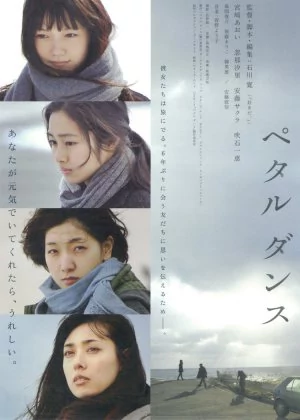Petal Dance

It took him a good while, but Hiroshi Ishikawa is back with a new feature film. Petal Dance [Petaru Dansu] is only his third feature in a little over 10 years time. Yet due to his unique style and pacing this is by far one of the most anticipated releases of the year for fans of Japanese drama cinema. My expectations were quite high, luckily Ishikawa managed to deliver for the third time in a row.
![screen capture of Petal Dance [Petaru Dansu]](/thumbs/img/articles/1200xauto/petal-dance-1.webp)
Having watched Petal Dance, I keep being amazed that Ishikawa is by profession a director of TV commercials. The style he applies in his feature films couldn't be more distant from the bling and dazzle-fueled impulses that are thought to be required to sell products to people. Petal Dance is no exception. There isn't too much plot, characters are often silent and don't confront their issues head on (though maybe more so here than in his previous films), instead Ishikawa registers their emotions and actions without providing much in the way of a manual for each character.
The first half hour of Petal Dance is a bit denser than usually the case. Ishikawa introduces four main characters, but doesn't immediately reveal the connection between the four. It's a bit similar to the setup in Tokyo.sora, except that Ishikawa brings them all together to form a more coherent storyline 30 minutes into the film. This slightly more complex setup feels a bit unnecessary though, as it does hinder the laid-back, mostly observing atmosphere that makes his films so unique.
Story-wise the film focuses on a trio of old college friends. One of the three is recovering from a suicide attempt, the other two get together to pay their old pal a visit. A fourth character is introduced somewhat out of the blue, but ends up joining the pair on their trip to visit their friend. There isn't much in the way of resolution or further dramatic tension to drag out the plot, instead Ishikawa simply follows the three who, on the road to the hospital, are trying to figure out the reason behind the suicide attempt.
![screen capture of Petal Dance [Petaru Dansu]](/thumbs/img/articles/1200xauto/petal-dance-2.webp)
Visually Ishikawa is still at the prime of his game. Again, the first 30 minutes are a bit hesitant and, while still excellent, miss some of the magic of the final 60. Ishikawa chooses a strict color palette, using milky blues and whites to paint a somewhat grimmer and colder picture compared to his two previous films. The framing and editing are still meticulous and virtually unmatched in their field, making the most of the settings and turning each single shot into a small marvel. Ishikawa's visual style may not be all that in your face, but it still evokes an impressive sense of beauty.
Ishikawa's musical preferences haven't changed too much either. Petal Dance features a rather minimal, mostly piano-based soundtrack, composed by (anime soundtrack legend) Yoko Kanno. There is one striking vocal track to underline the most important scenes of the film, apart from that the soundtrack is mostly supportive in nature. Never drawing too much attention, but proving an essential part of the overall atmosphere.
To balance out his cast Ishikawa mixed a few of Japan's biggest names in the acting business (namely Masanobu Ando, Aoi Miyazaki and to a lesser extent Sakura Ando) with a series of far less familiar faces. Not that acting experience plays a big factor in his films, Ishikawa is once again able to let his actors rise above themselves, drawing out very natural performances and having them bring their characters to life with a minimum of gestures and dialogue. This style may not to everyone's liking, but it's essential to the type of film Ishikawa wants to make.
![screen capture of Petal Dance [Petaru Dansu]](/thumbs/img/articles/1200xauto/petal-dance-3.webp)
While the first part of the film doesn't quite live up to the legacy of Ishikawa's previous films, the final hour definitely does. Once the trio hits the road, Petal Dance becomes a continuous string of memorable scenes and moments, graciously documenting the trip of the three girls. The emotional climax (the "petal dance" scene) is one of the best I've ever seen and left me contented and slightly perplexed all the way through the end credits.
Petal Dance is a more than solid addition to Ishikawa's oeuvre. While as a whole not quite up there with Su-ki-da and Tokyo.sora, it's still by far one of the most impressive Japanese drama films I've seen. Playfully poetic, magically serene and pleasantly dreamy, watching this film is a calming experience that puts you right in there with the characters while providing a superb aesthetic frame. Ishikawa is still the man to beat, and he only fortifies that position with Petal Dance.